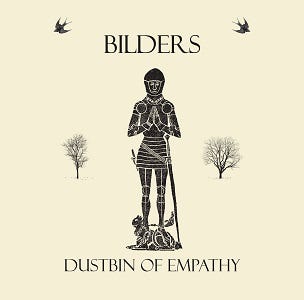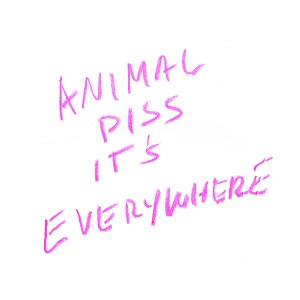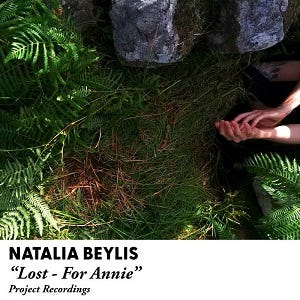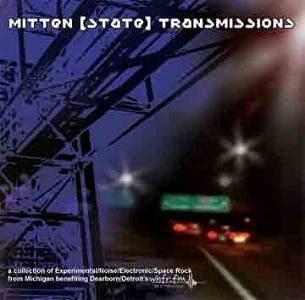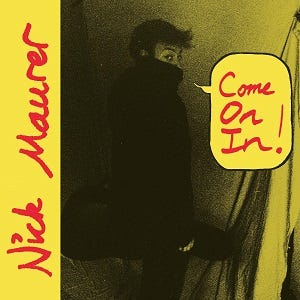RECENT LISTENING #38
Bilders, Animal Piss It's Everywhere, Ned Colette, Natalia Beylis, Feminist Improvising Group, Max Eastley + Logos Ensemble, Derek Bailey, Raskovich, Mitten [State] Transmissions, Nick Maurer
BILDERS Dustbin of Empathy LP (SOPHOMORE LOUNGE/GRAPEFRUIT) Whoah, a brand new Bilders album in 2024? Which is to say, a brand new album of poetic songs by sexagenarian New Zealand singer/songwriter/guitarist Bill Direen backed by an ever-revolving always-crack punk/folk/rock/progressive band? This time I see he has Alex McManus in the band, here credited with eleven different instruments (primarily “guitars”) and someone who, as us Nebraska heads already know, has been sweetening up lo-fi and “lo-fi” singer/songwriter tracks for years (just ask Simon Joyner or Kurt Lambchop for starters). Direen and McManus are joined by one other full-time credited member, Matt Swanson on bass and four other instruments. This new lineup of the Bilders creates a less raw and burning sound than the 1980s vintage, and yes, it could slot right in with what your nearest upscale live music nonprofit wine bar might present on a Friday night, or among the programming on your local NPR affiliate, and I was going to use the word “deferent” to describe it, but really this music is only deferent to Direen’s age, his wisdom, and the change in delivery that happens to an artist at age 67 compared to the same artist as a young punk aged 23, as he was when the first Bilders records came out. And it doesn’t mean that all kinds of Direenian imagery, history, and philosophy isn’t bubbling beneath any NPR-friendly surface. There’s a poster insert that folds out into a very dense lyric sheet, and even after spinning the whole album through, I can’t believe I just heard that many words, as I immediately start a second listen and catch Direen sighing out the world-weary lines, “He ran off to Odessa/for the charms of Asia the Lesser/and the arms of a portly Turk/took bridge building work,” in the opening track “Citizens of Nowhere,” which unfolds like a period film based on a heavy chorus thesis: “Belong belong to the weak to the strong/We run here we run there/Citizens of nowhere.” I mean, let them be NPR-friendly! Get this lineup a Tiny Desk Concert now! And as I say that, now side two is progressing into the relatively dark and driving and, yes, punkish “Anvil Dark” — early Nun & Xpressway heads make sure you check out this track, further proof that Bill Direen records always contain multitudes, before any premature LP dismissal due to ‘NPR vibes’ might occur.
ANIMAL PISS IT’S EVERYWHERE Grace LP (SOPHOMORE LOUNGE) Another new one on the Sophomore Lounge label and goddammit, they should be playing this on NPR too. It would be such a step up, and honestly it would work OK, because this is ambling dreamy country rock, with pedal-steel and everything. This music can also can be a little rough and awkward like the band name itself, which is the part NPR might wince at, but maybe you won’t, and I know I don’t. In fact, I think this album is beautiful. Just got through side one’s closing back-to-back wistful tearjerker doozies “Dana Plato” (“Dana Plato, Dana Plato/You were a TV star/Dana Plato, Dana Plato/fucked with a rock’n’roll star”) and “Ma’s Song” (“Please tell me Ma/what to do next/’cause I don’t have/any ideas left”), and damn. On the latter, the band shows they can not only break your heart but also open up grooves and let in cosmo-interplay. They don’t do it on every track, playing their country-rock straight just as often, but the more you listen, the more you learn where those cosmo-openings are, like when some Rounders/Fugs-style vocal mumbles give way to sudden R&B saxophone in the album opener “Beach Song,” and suddenly you’ve gone through a portal you might not have even noticed the first time through. After all, there is an Animal Piss It’s Everywhere affiliation or two with those co(s)mic jokers in Sunburned Hand of the Man, not to mention an artist of the caliber of Anthony Pasquarosa in the lineup, and even when Animal Piss are playing it straight we’re talkin’ Corky’s Debt-straight at its straightest.
NED COLETTE Our Other History LP (SOPHOMORE LOUNGE) Might as well make this a Sophomore Lounge roundup, as the label has been tearing it up even more than usual, and this goddamn Ned Colette LP just hit the turntable as we were going to press, and . . . goddamn! Increasingly knowing less and less just what to expect when a Sophomore Lounge release does hit the turntable, I was surprised and rather immediately swept away by the languid orchestral singer-songwriter atmospheres getting rolled out here. Not even halfway through the 8-minute widescreen epic opening title song, I’m thinking certain thoughts, you know the ones you think sometimes, like . . . “cult masterpiece 30 years from now?” “And also right now?” “The next Stormcock”? “Is he going to be able to keep this up?” And one more goddamn, he certainly is able to keep this up, right up until the needle lifts off of side two and the music continues to resonate deeply, until you play it again, which will probably be soon. Who is Ned Colette, anyway? He is Australian, I can tell you that. Mick Turner and Jim White from the Dirty Three are each on a couple tracks, and there’s a double bass here and a trumpet there, but mostly this is Colette stacking rich and haunting guitar/piano/synth tracks and singing deep haunted/haunting lyrics and melodies, but he does get support, as crucial as it is minimal, from Leah Senior on backing vocals, Elisabeth Fuchsia on viola, and Steve Heather on drums. If you want to read more accurate thoughts about Our Other History, check out Doug Mosurock’s “wrecked by a release” musings over at Heathen Disco, and the effusive liner notes by Will Oldham for the LP itself, excerpted on Bandcamp but available in full if you buy a physical copy, which you should, if it wasn’t clear.
NATALIA BEYLIS “Lost—For Annie” CS (PROJECT RECORDINGS) Pulled this one off of a Bandcamp column, the May 2024 installment of the Acid Test roundup column written by Miles Bowe, to be specific. Every month Bowe highlights 6 or 7 different releases and I always feel like I should check out at least 4 or 5 of them immediately, but never do, and instead leave the tab open on my phone for months at a time, until today when I finally pushed play on this Bowe-recommended cassette/digital release by Irish field recordist, musician, and composer Natalia Beylis. I like how it’s the same length as a vinyl LP, and even starts with what would be a side-long jam, the 19-minute title track. We hear birdsong, not to mention samples from a songbird identification record, blended with a billowing intentionally (?) muffled organ-ish electronic drone. From there the piece slowly evolves and expands outward into other field recordings of sounds industrial and unidentifiable, as well as wind, water, and footsteps, all while the drone is tightening inward. Soon and suddenly, the electronics are gone and it’s just the footsteps of the field recordist, crystal clear, quiet and live, for a long time, and there’s no longer any birdsong, because presumed recordist Beylis is apparently walking through a “recently clear-felled forest” at a commercial farming site in Ireland. I don’t know if anyone would pick up on any of this without reading the Bandcamp liner notes, or hearing the audio as part of an actual visit to the 2023 installation it was composed for, “Lost” by the artist Annie Hogg. Still, the audio is quite arresting on its own, and the idea is that we might understand these things subliminally, right? We may not know these things, but we can still feel these things, and feeling is a way of knowing. The second track “Interviews with Participants in the Leitrim Sweathouse Project,” is just that, 12 minutes of unadorned and unprocessed interviews with various people discussing the remaining ancient stone saunas that apparently still dot parts of the Irish countryside. There are two more tracks that also developed from this Sweathouse project, the first one a brief “ceramic object” interlude, and the second one a rather massive organ drone. The liner notes refer to Annea Lockwood’s “Sound Maps of the Danube” as a precedent, and the first two tracks on here are indeed not so much songs or even pieces as they are sound maps. I suppose the 32 seconds of sound made by a ceramic object is a sound map too. But is the final woozy murky organ drone with faint percussion skittering in the background also a sound map? It doesn’t have the inferable geographical and environmental data that a true sound map has, which I think makes it more of a good ole psychedelic closing jam.
MAX EASTLEY + LOGOS ENSEMBLE/FEMINIST IMPROVISING GROUP/COUM + LOGOS ENSEMBLE/DEREK BAILEY Another Evening at Logos 1974 79 81 2LP (LOGOS/SUB ROSA) This double album came up on my endless Shitify FULL ALBUMS ON DECK shuffle and I was intrigued enough to stop and break shuffle and listen to the whole thing. Or 3/4th of it, at least, as the COUM + Logos Ensemble track featuring Cosey and Genesis is curiously not part of the Shitify version. It’s a fascinating four-artist compilation, and my main takeaway is . . . how have I been a fairly avid student of European free improvisation for as long as I have without ever really knowing about the Feminist Improvising Group? Especially considering that it was founded by the relatively ‘famous’ Lindsay Cooper (yes, in my world you absolutely are famous for being the bassoonist/oboeist in Henry Cow) and Maggie Nicols (who sang on the famous-in-my-world 1969 John Stevens/Spontaneous Music Ensemble s/t LP), and sometimes (as on the track herein) included the filmmaker Sally Potter (who went on to have an arthouse hit with Orlando in 1992, also a bit of a breakout role for thee Tilda Swinton)? Well, maybe it’s because they’re not only women but also (gasp) feminist women and intersectional erasure really is a thing. I didn’t know about Max Eastley before either, though, and really like his Logos Ensemble track on here too, everyone just playing weird reticent balaphone/xylophone-and-woodwinds type jamming for over 20 minutes (the internet tells me this is “Max Eastley, Godfried-Willem Raes, Moniek Darge, and Rob Keymeulen playing xylophone bars, Aeolian flutes, springboard, sanzas”), and speaking of weird and reticent, yet also as mighty as ever, the album closes out with 20 minutes of Derek Bailey jamming solo electric guitar, which leads me to ask, and not for the first time: just what in thee hell was the genre of music that Derek Bailey invented/extended for over 40 completely uncompromised years straight? “Free improvisation,” I guess, but I don’t really find that adequate. Whatever you call it, side 4 of this record is another great example of it.
RASKOVICH Background Music N.1 (OTTER RECORDS/BACKGROUND MUSIC) I have more questions, like who is Raskovich? Why is this album also on my FULL ALBUMS ON DECK playlist? When did I put it on there? Why is there a secondhand copy of this album, an Italian vinyl LP pressing released in 1977, currently going for $1,304.35 on Discogs? Listening to its foreboding atmospheric solo electronics now, I have to wonder if it’s because it’s the first ever dungeon synth album. And maybe that’s also why it’s on my playlist, because not too long ago I was glumly tapping and swiping on my phone one day, and came across a hot new listicle on Vulture or Popmatters or Medium or Reddit, some irresistible headline like “Dungeon Synth Before Dungeon Synth! 20 Albums That Paved the Way!,” and found myself baited into clicking and skimming and even added a couple of ‘em to the playlist. To be honest, I’m now really only finding this Raskovich LP interesting if I think of it as a very early dungeon synth album. Which makes me wonder . . . was Klaus Schulze very early dungeon synth too? A case for Irrlicht, perhaps? It also makes me think those paranoid 2020s thoughts, like my phone was consistently playing a certain harmony/frequency/duration blend over the course of a few days, and that activated a dungeon synth algorithm, and then my mic was listening and my phone’s brain overheard that one co-worker of mine cracking wise a couple weeks ago about how the kids these days were all into dungeon synth (this wisecrack really happened and yes, my phone probably heard it), and then cross-referenced those algorithms with some other reliable metatags like 20th century composition, Discogs collectables, and of course krautrock. (If you’re a busy young algorithm just getting started with experimental and underground private press LPs from Europe in the 1970s, you’ve always gotta reference krautrock, regardless of what country the artist is actually from, Raskovich being the nom de plume of Italian keyboardist and composer Giuliano Sorgini.)
VARIOUS ARTISTS Mitten [State] Transmissions 4CD+DVDR (TOP QUALITY ROCK’N’ROLL) Anyone else know of this dare-I-say inzane 4CD (plus 1 DVDR) box set, apparently released in that halcyon year 2006, featuring 46 tracks and 10 videos by various noise/experimental/etc artists all from the great state of Michigan? I had no idea this release ever happened (or completely forgot it did) until now, after discovering it on Shitify and seeing that it apparently also exists in the physical world via Discogs.com. It does have some of the usual Michigan suspects I already know of, like Wolf Eyes, Mammal, Hive Mind, Charlie Draheim, Windy & Carl, Fred Thomas, Viki . . . hell, I even know who Cotton Museum, Frank Pahl, and Terror at the Opera are . . . but I don’t know any of the rest, and that’s like 36 more artists, and it’s all a really good listen. Scenes within scenes and scenes-of-one within scenes-of-five because something/anything is always going on somewhere/anywhere.
NICK MAURER Come On In! LP (HAPPY FAMILIES) Last month I was visiting the new-to-Chicago-having-moved-from-Cincinnati record store Torn Light for the first time and chatting with the shopkeeper about their excellent selection, their in-house record label, and that we had some mutual friends as we’re all basically 20 years deep in this sub-underground music game by now. He handed me a record they had released by one Nick Maurer, in case I wanted to give it some coverage. As I’d mentioned, Torn Light was founded and formerly located in Cincinnatti, Ohio, where Maurer also lived and maybe still does. He was a kid who would frequent that original location, into all kinds of music and literature and culture like all of us maniacal post-1990s internet sponges were, eventually handing the clerks a cassette of his own music, folky/punky post-Barlow sub-underground home-recorded solo guitar playing and singer/songwriting. They found themselves playing Maurer’s tape more than they thought they might, and eventually came to like it so much they pressed it on vinyl. I have to admit that I might’ve gotten my fill of this exact style early on, by being quite close to its 1990s Midwestern epicenter, the prolific and proto lo-fi (and already referred to indirectly in this very column) Sing, Eunuchs! and Unread record labels. So much to love, so many ideas and thoughts and personal feelings expressed, but in this whole nation/worldwide underground movement there were often times where the result was less about music and more about the person, the diary, etc. The person and the diary are certainly allowed, but they only make great music they’re in there to serve the music, and not the other way around. I do sense that Nick Maurer is on the right side of the equation, in no small part because the album seems a good 30% to 50% instrumental, his solo guitar playing moving through ramshackle takes on country blues, British skiffle, detuned mento/calypso, good old punky poppy rock’n’roll, and who knows what else. The vocals and feelings come and go, always riding the wave of that inspired guitar playing. The recording is pretty rough, and it may all hit you as just another lo-fi annoyance, but I haven’t been in this zone for awhile and I am finding Come On In! to be of that vintage Sing Eunuchs!-in-1993 or Unread-in-1998 caliber.

